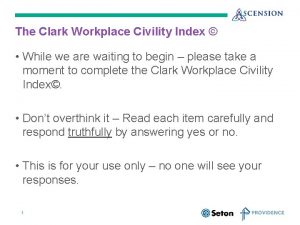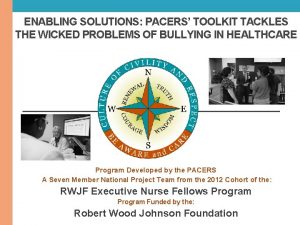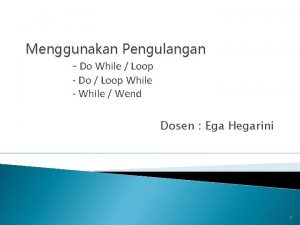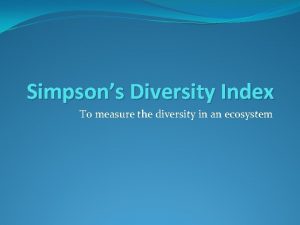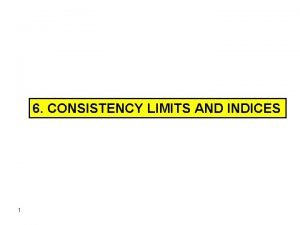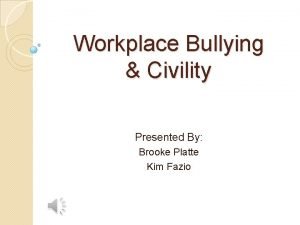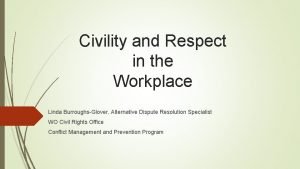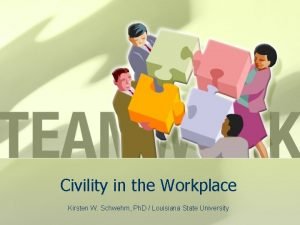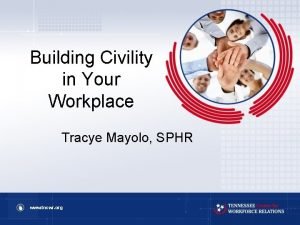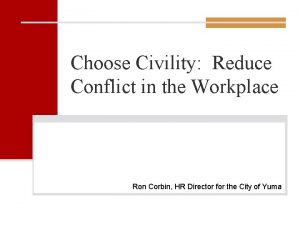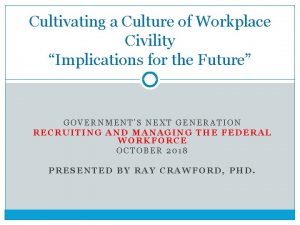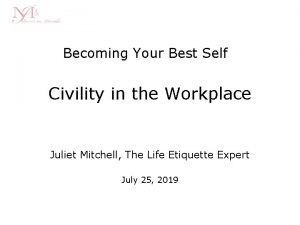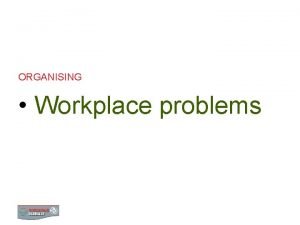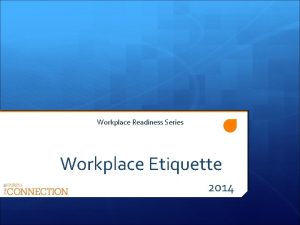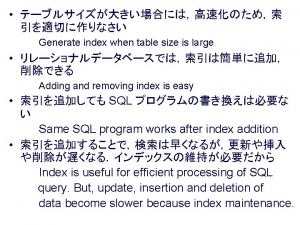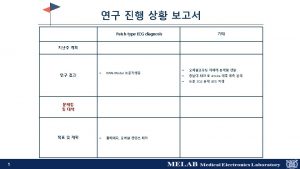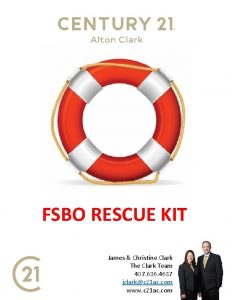The Clark Workplace Civility Index While we are




























- Slides: 28

The Clark Workplace Civility Index © • While we are waiting to begin – please take a moment to complete the Clark Workplace Civility Index©. • Don’t overthink it – Read each item carefully and respond truthfully by answering yes or no. • This is for your use only – no one will see your responses. 1

Nancy Mastronardi, MSN, RN, CPHQ Seton Heathcare Family October 27, 2017 ASCENSION TEXAS The Price of Silence: The impact of ignoring incivility, lateral violence and bullying in the professional practice environment.

Outcomes The attendee will be able to: • Identify the key behaviors of incivility, lateral violence and bullying that negatively impact the professional work environment. • Describe the impact of ignoring incivility, lateral violence and bullying on the nurse, the patient and the organization. • Commit to zero tolerance and apply strategies discussed to manage these behaviors when witnessed or experienced in the professional work environment. 3

Ascension is the largest nonprofit health system in the U. S. and the world’s largest Catholic health system. In Texas, Ascension operates Providence Healthcare Network and Seton Healthcare Family, which includes Dell Children’s Medical Center of Central Texas and 120 related clinical facilities that together employ more than 13, 000 employees. Seton Healthcare Family has 3 Magnet and 3 Pathway to Excellence designated hospitals. 4

It’s Time to Confront Reality. . . Recognizing incivility/lateral violence and bullying. . . getting our heads out of the sand 5

Let’s call it what it is! • • • Incivility: “Rude or disruptive behaviors which often result psychological or physiological distress for the people involved – and if left unaddressed, may progress to threatening situations” (Clark, 2013) Lateral Violence: “Sabotage directed at coworkers who are on the same level within an organization’s hierarchy” (Dunn, 2003) Bullying: “The persistent, demeaning, and downgrading of humans through vicious words and cruel acts that gradually undermine confidence and self-esteem” (Adams, 1997) 6

Why? • Oppressed-Group Theory • An increasing sense of powerlessness in the practice environment (downsizing, competition) • Generational differences • Personality issues. . . some people are just “jerks”. . . and they are everywhere. 7

Incivility/Bullying – Covert to Overt • Nonverbal - eye rolling • Incomplete information • Rude or snide comments • Gossiping • Broken confidences • Sarcasm/teasing • Exclusion / Ignoring 8 • Judging / criticism • Invading personal space • Undermining / not available • Toxic email • Accusing / blaming • Public ridicule • Intimidation

So. . Have you witnessed or experienced incivility, lateral violence or bullying in your practice environment? 9

Have you spoken up to the perpetrator? • Absolutely, “We don’t play like that on my unit” • No, that’s just part of the culture; people need to get over it • I used to, but nothing ever happened so I quit • What? ? Are you smoking crack? ? . . . I have to work here!! 10

Recent Research on New RN Experiences During first year of practice, novice nurses report: • • Undervaluing by team members Blocked learning opportunities Emotional neglect Being given too much responsibility without support • Rude or humiliating comments 11

What is “reverse bullying”? • “At the heart of "reverse bullying" is technology, because newer nurses are highly familiar with the latest gizmos. They are fast with tablets and they can navigate through an electronic health record [EHR] with ease. • Younger nurses can bully older nurses by treating them as if their knowledge is antiquated, “washed up, ” or out of step with the times. Older nurses can be excluded from social activities in the unit, made fun of for physician limitations, and ignored by the younger nurses”. (Greg Thompson) 12

Why Should You Care? • Repeatedly compromising one’s integrity causes moral distress - research shows that nurses who experience burnout, more often than not feel like they haven’t been living up to their moral values. • 80% of nurses who experience long term incivility will leave the organization. Cost of replacing a nurse is estimated at $65 -$90 k depending on specialty. • Patient’s may pay the price – 67% nurses report a percieved link between bullying and adverse events (Rosenstein & Daniel, 2008). 13

The Price of Silence. . . The Downstream Impact of Ignoring Incivility/Lateral Violence/Bullying 14

The Price of Silence – Impact on the Organization • Low staff morale • Increased turnover • Attendance issues • Decreased productivity • Decreased staff and patient satisfaction • Negative impact on patient safety • Decreases quality of care and unit effectiveness 15 July 18, 2016

The Price of Silence – Impact on Nurses • Decreased self-esteem • Depression/Isolation • Feelings of hopelessness and worthlessness • Lack of connection to the organization • Frequent illness/Sick Calls • More likely to make errors 16 July 18, 2016

So…. Why don’t we speak up? ? 17

What Does the Research Say? • Fear of retaliation – powerlessness • These nurses are often the clinical experts and “Queen Bees” of the unit • Don’t believe anything will change • Don’t want to be ostracized • No idea what to say – caught off guard 18

Everyone is accountable to zero tolerance! Organization • Must have zero tolerance/focus on patient safety • Clear policies/consequences • Culture of high reliability behaviors Nurse Leaders • Model desired behavior • Assessment of the culture/address issues early • Round on clinical staff Staff Nurses • “If you permit it, you promote it” (Quint Studer) • Understand embrace generational differences • Use Chain of Command 19

ANA Code of Ethics With the granting of licensure nurses agree to uphold 9 non-negotiable ethical standards. Provision One (interpretive statement) Nurses are required to “create an ethical environment and culture of civility and kindness, treating colleagues, co-workers, employees, students, and others with dignity and respect. ” Similarly, nurses must be afforded the same level of respect and dignity as others (ANA, 2015). Thus, the nursing profession will no longer tolerate violence of any kind. 20

Resources/Tools ANA – multiple educational resources/toolkit AACN Position Statement on Zero Tolerance BON Standards of Professional Practice/UC Teaching/building resilience • “Three Good Things” – gratitude exercise • Brene Brown – Vulnerability TED talk (2010) Cognitive Rehearsal Techniques 21

Cognitive Rehearsal Behavior Non-Verbal Innuendo • Eye rolling • Making faces • Sighing 22 Response “I sense (or see) that there may be something you wanted to say to me. It is okay to speak directly to me”

Cognitive Rehearsal Behavior Response Infighting Scapegoating (blaming all that is wrong on one person) “This is not the time or the place. Please stop” (walk away) “I don’t think that is the right connection” 23

Cognitive Rehearsal Behavior Response Backstabbing (complaining to others about an individual and not speaking directly to them) “I don’t feel right talking about him/her/situation when I wasn’t there or don’t know the facts. Have you spoken to him/her? ” 24

Situations ripe for incivility/LV and bullying… Important for leaders and clinical nurses to be aware of the unit atmosphere. Be proactive dealing with: • • • Newbies – young grads, 2 nd career, returning to workforce Generational and educational differences Stressors caused by high turnover rates, staffing issues Energy vampires Shift riffs Cliques 25

Leaders – be proactive Don’t wait for this to happen on your unit. Remind yourself to be ABLE! A: Act now to address conflict, relational aggression B: Bolster your belief in all team members, and show that you believe they are talented, important and appreciated L: Lead through example. Role model the behavior you expect from staff. E: Expect excellence and empower your employees (Dellasega & Volpe, 2013) 26

Closing Thought “Our lives begin to end the day we become silent about things that matter. ” - Martin Luther King - 27

Clark Workplace Civility Index - Scoring After you’ve responded to each question, total the number of yes responses to determine your overall civility score. Scores range from 0 -20. • • • 18 to 20 yes responses (90%): Very civil 16 to 17 yes responses (80%): Moderately civil 14 to 15 yes responses (70%): Mildly civil 12 to 13 yes responses (60%): Barely civil 10 to 11 yes responses (50%): Uncivil < 10 yes responses: Very uncivil 28
 Workplace civility index
Workplace civility index Mikael ferm
Mikael ferm Understanding civility and cultural competence
Understanding civility and cultural competence Mc aee
Mc aee Masonic civility
Masonic civility Pacers civility toolkit
Pacers civility toolkit Clark and clark marketing functions
Clark and clark marketing functions Perbedaan while loop dan for loop
Perbedaan while loop dan for loop Limitations of pqli
Limitations of pqli Optical fibre
Optical fibre Mode theory of circular waveguide
Mode theory of circular waveguide Dense secondary index
Dense secondary index Simpson's index equation
Simpson's index equation Mitsuda reaction
Mitsuda reaction Clustered index và non clustered index
Clustered index và non clustered index Consistency index and liquidity index
Consistency index and liquidity index Tỉ lệ cơ thể trẻ em
Tỉ lệ cơ thể trẻ em Thế nào là mạng điện lắp đặt kiểu nổi
Thế nào là mạng điện lắp đặt kiểu nổi Lời thề hippocrates
Lời thề hippocrates Vẽ hình chiếu đứng bằng cạnh của vật thể
Vẽ hình chiếu đứng bằng cạnh của vật thể Quá trình desamine hóa có thể tạo ra
Quá trình desamine hóa có thể tạo ra Các môn thể thao bắt đầu bằng từ đua
Các môn thể thao bắt đầu bằng từ đua Hình ảnh bộ gõ cơ thể búng tay
Hình ảnh bộ gõ cơ thể búng tay Sự nuôi và dạy con của hươu
Sự nuôi và dạy con của hươu điện thế nghỉ
điện thế nghỉ Dot
Dot Nguyên nhân của sự mỏi cơ sinh 8
Nguyên nhân của sự mỏi cơ sinh 8 độ dài liên kết
độ dài liên kết Trời xanh đây là của chúng ta thể thơ
Trời xanh đây là của chúng ta thể thơ
